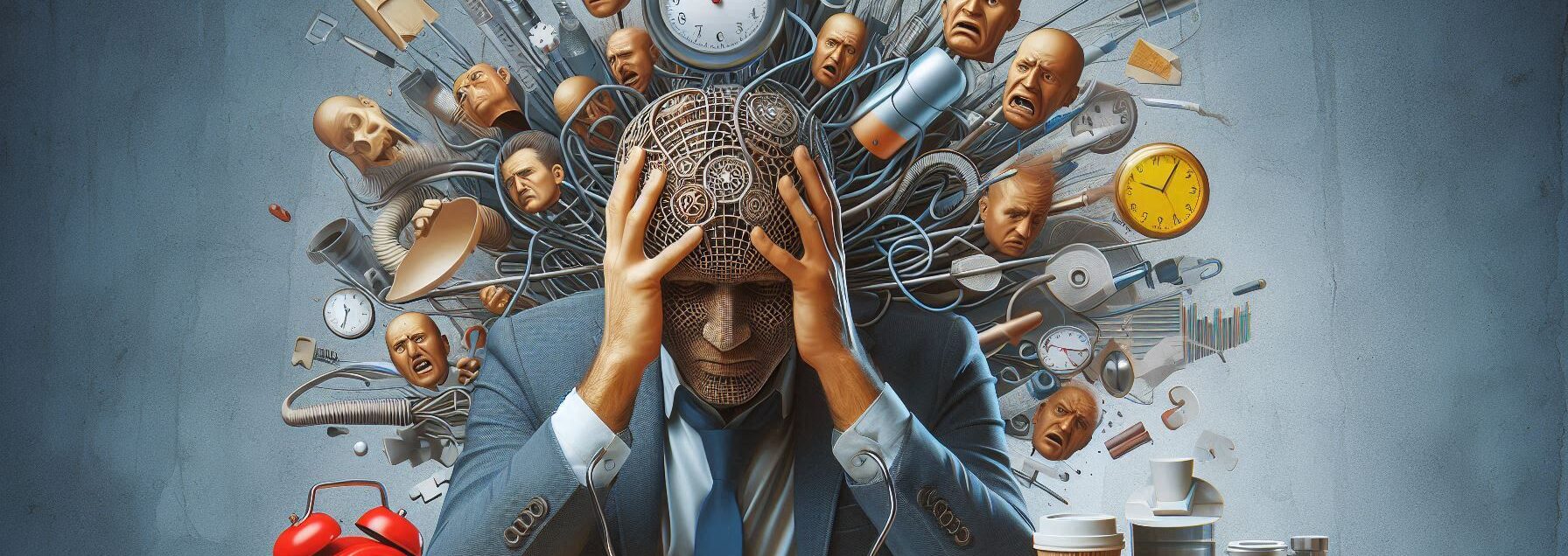Let’s face it: life can feel like a never-ending game of Whac-A-Mole. Just when you think you’ve got one problem solved, another one pops up, demanding your attention.
Whether it’s work deadlines, family obligations, or the sheer insanity of trying to keep your houseplants alive (seriously, how do they expect us to remember to water them?), stress can build up faster than I can say “Where did I put my keys?”
So today, we’re diving into the murky waters of burnout—what it is, how to recognize it, and why you should probably take a break before you start screaming at inanimate objects.
Top Takeaways and Key Concepts
- Recognize burnout signs like constant fatigue, irritability, reduced performance, and detachment.
- Understand burnout’s impact on mental health, as chronic stress can trigger anxiety and depression.
- Set boundaries to protect your time and energy, saying “no” when necessary.
- Take breaks and prioritize self-care activities to recharge and maintain well-being.
- Seek support from friends, therapists, or mindfulness practices to manage stress effectively.
Summary of This Article
This article explains burnout as chronic stress leading to emotional exhaustion, reduced performance, and detachment from work or hobbies. It highlights mental health consequences, including increased anxiety and depression, if burnout is ignored. Key strategies for prevention include setting boundaries, taking breaks, practicing self-care, seeking social or professional support, and incorporating mindfulness techniques. Recognizing early signs and proactively addressing stress helps maintain balance, protect mental health, and improve overall life satisfaction.
What Is Burnout Anyway?

By the way, if you think burnout is just an excuse for not getting out of bed on a Monday morning while wearing pajamas that haven’t seen soap in three days—well, let me enlighten you.
Burnout isn’t just about feeling tired; it’s like the emotional equivalent of running a marathon without training and then realizing halfway through that you’re still in your flip-flops.
Burnout happens when chronic stress takes over your life and leaves you feeling drained and overwhelmed. It’s as if someone has sucked all the joy out of your favorite activities—like eating pizza or binge-watching shows while pretending you’ll go for a run tomorrow.
You might find yourself feeling detached from work or home responsibilities because frankly, they seem more daunting than climbing Mount Everest in flip-flops.
And let’s be real here: recognizing burnout often feels like trying to spot Waldo in a sea of red-and-white striped shirts. You know something’s off but pinning down exactly what is trickier than explaining TikTok trends to your parents.
Signs You Might Be Experiencing Burnout
So how do we identify this sneaky little gremlin called burnout? Well, there are some classic signs that may suggest you’re teetering on the edge of mental exhaustion:
1. Constant Fatigue: If getting out of bed feels akin to lifting weights with your eyelids every morning, congratulations! You might be experiencing burnout. Even coffee seems less effective than usual—and if coffee isn’t doing its job, we have a serious problem!
2. Irritability: Are small things starting to annoy you? Like when someone chews too loudly or when the barista spells your name wrong for the tenth time? If so, welcome aboard! This ship is sinking fast!
3. Reduced Performance: Tasks that once seemed manageable now feel monumental—like trying to assemble IKEA furniture without instructions while blindfolded. Your brain might feel foggy as if you’ve been stuck in traffic on an endless highway with no exit in sight.
4. Feeling Detached: When was the last time you genuinely enjoyed something? If Netflix marathons are starting to lose their charm and hobbies sound more exhausting than enjoyable… well folks, that’s a red flag waving furiously at us!
The Impact of Burnout on Mental Health
Interestingly enough, burnout doesn’t just affect our productivity; it also takes a toll on our mental health.
Think about it this way: being burned out feels like driving with flat tires—you can still move forward but at an agonizingly slow pace while bouncing around uncomfortably.
Chronic stress can lead to anxiety and depression—a delightful combo platter nobody asked for! As things pile up higher than my laundry basket (which could probably double as a makeshift mountain), feelings of hopelessness may start creeping in like unwanted guests who refuse to leave after midnight.
What’s even worse is that many people try pushing through these feelings instead of addressing them head-on! Spoiler alert: ignoring problems usually leads only to bigger problems—like forgetting where you left your car keys…again!
Strategies for Preventing Burnout
Now that we’ve established what burnout looks like (and why it’s essential not to ignore it), let’s talk strategies for preventing this pesky intruder from crashing our party:
1. Set Boundaries: Honestly speaking, saying “no” doesn’t make you selfish—it makes you smart! Know your limits and stick by them like glue (the non-toxic kind).
2. Take Breaks: I know what you’re thinking—“But I don’t have time!” To which I say: “You don’t have time *not* to take breaks.” Even short pauses throughout the day can recharge those batteries faster than plugging into an outlet during a power outage.
3. Engage in Self-Care: Find activities that fill your cup rather than drain it dry! Whether it’s reading books about magical creatures or treating yourself to ice cream (because who doesn’t love ice cream?), prioritize what makes YOU happy!
4. Seek Support: Don’t hesitate to reach out for help! Friends are great listeners (especially when they’re holding snacks) and therapists exist for precisely these moments when everything feels overwhelming.
5. Practice Mindfulness: By practicing mindfulness techniques such as meditation or deep breathing exercises regularly—you’ll train yourself how not only survive stressful situations but thrive despite them!
Conclusion
In conclusion—and here comes my grand finale—I hope this article sheds light on recognizing burnout before it becomes an unwelcome guest living rent-free in your mind!
Remember that prioritizing mental health isn’t merely optional; it’s crucial for leading fulfilling lives filled with joy…and possibly even pizza parties!
Suggested Resources:
Mental Health America
https://www.mhanational.org/
National Alliance on Mental Illness
https://www.nami.org/
American Psychological Association
https://www.apa.org/
Frequently Asked Questions
What are the early signs of burnout?
Common signs include constant fatigue, irritability, reduced performance, and feeling detached from work, hobbies, or daily responsibilities.
How does burnout affect mental health?
Burnout can increase anxiety, lower mood, and contribute to depression by overwhelming emotional and physical resources over time.
What causes burnout to develop?
Burnout often develops from chronic stress related to work, family demands, or lack of rest, eventually leading to emotional exhaustion.
How can setting boundaries help prevent burnout?
Setting boundaries protects your time and energy, reducing pressure and helping you maintain a healthier balance between responsibilities and rest.
What self-care strategies help reduce burnout?
Regular breaks, enjoyable hobbies, mindfulness practices, and prioritizing sleep can help replenish energy and improve overall well-being.
When should I seek support for burnout?
If symptoms persist, worsen, or begin affecting your daily functioning, seeking support from friends, therapists, or support groups can be beneficial.
Can burnout be reversed once it starts?
Yes, with rest, boundaries, self-care, and support, burnout can improve, allowing you to regain clarity, motivation, and emotional stability.

Kevin Collier is a passionate mental health advocate and writer for SadFAQ.com, where he explores the complexities of depression and mental well-being. With a deep understanding of mental health challenges, Kevin provides compassionate insights and practical advice to help individuals navigate their journeys toward healing. His articles aim to destigmatize mental health issues, offering support and resources for those seeking to improve their emotional resilience. Committed to raising awareness and fostering open conversations, Kevin’s work empowers readers to prioritize their mental health and seek the support they deserve.




